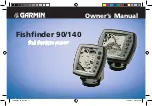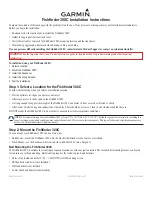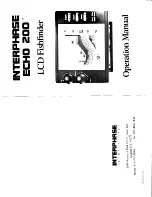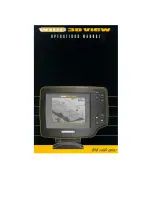
Chapter 4: Fishfinder Operations
4-3
Bo
tto
m I
nd
ica
ti
on
s
In Bottom lock mode the fish arches may appear distorted as the bottom
topography is removed from the image.
Bottom Indications
The bottom usually produces a strong echo, so it is easy for the Fishfinder to
see a lot of detail. The Fishfinder can indicate many different kinds of bottom
conditions.
As illustrated in Figure 4-2, a hard bottom appears as a thin line.
Figure 4-2:
Fishfinder Bottom Indications
An uneven bottom which is covered with rocks or coral produces a complex
display; the bottom image is irregular, with long tails pointing upward. A
wreck produces a similar image.
A softer bottom or a bottom covered with seaweed produces a wide line, as the
sound waves reflect from different layers of the bottom. In Figure 4.2b, the
Fishfinder is getting a good echo from the bottom, so the upper layer of the
bottom is shown as dark gray. Notice that the lower layer of the bottom is
shown as a lighter gray, this indicates a weaker echo. This could mean that the
upper layer is soft; some sound waves may get through this layer and be
reflected as a more solid layer below.
D5016-1
A
Hard bottom (sand)
B
Soft bottom (mud)
C
Rocky bottom
D
White line feature on:
Summary of Contents for HSB L755
Page 2: ......
Page 30: ...1 18 HSB Series L755 and L760 Fishfinder Database Lists...
Page 76: ...2 46 HSB Series L755 and L760 Fishfinder Transmitted Data...
Page 114: ...3 38 HSB Series L755 and L760 Fishfinder Review Your Passage Plan...
Page 128: ...4 14 HSB Series L755 and L760 Fishfinder MOB...
Page 196: ...8 8 HSB Series L755 and L760 Fishfinder Worldwide Support...
Page 200: ...A 4 HSB Series L755 and L760 Fishfinder Appendix A Specifications...
Page 206: ...B 6 HSB Series L755 and L760 Fishfinder Appendix B Using the Auxiliary Junction Box...
Page 212: ...C 6 HSB Series LCD Color Display Appendix C C MAP Chart Card Features...


































